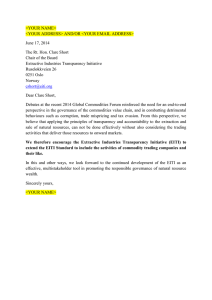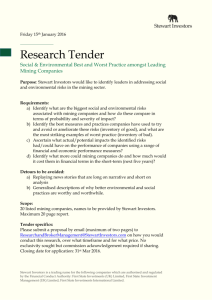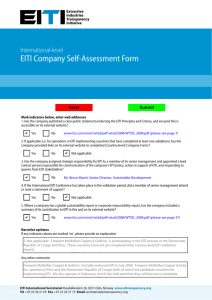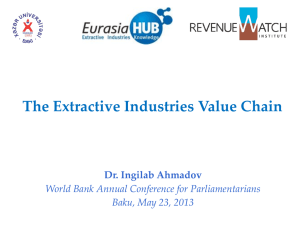Proposal for the Extractive Industry Transparency Initiative Strategic Review 2013
advertisement
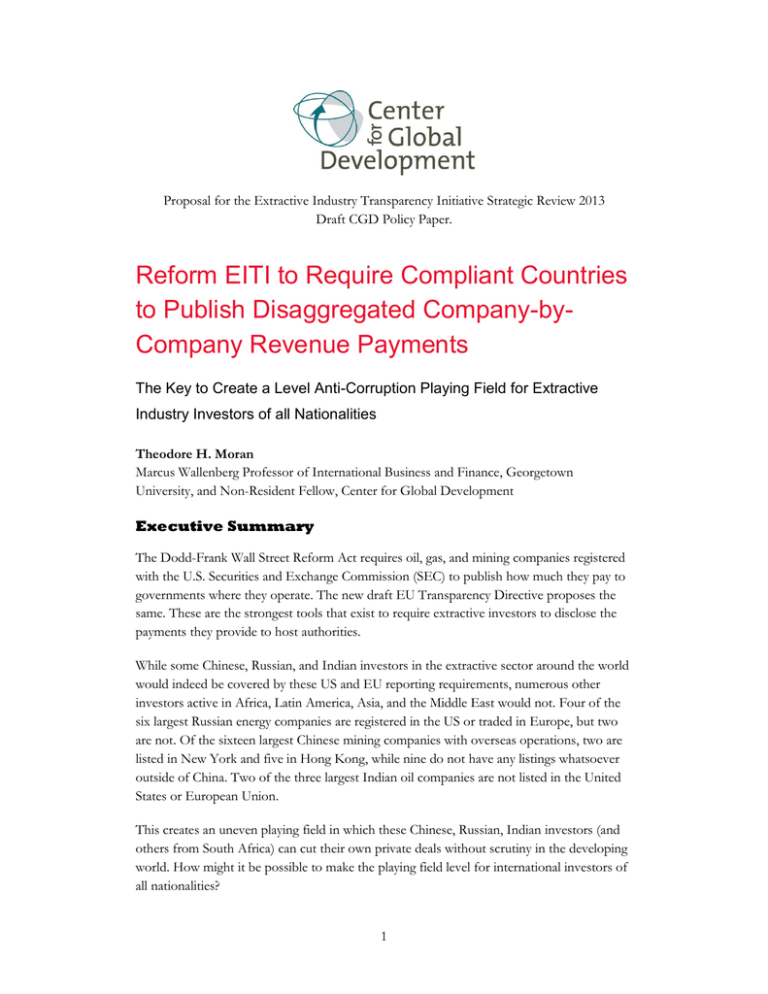
Proposal for the Extractive Industry Transparency Initiative Strategic Review 2013 Draft CGD Policy Paper. Reform EITI to Require Compliant Countries to Publish Disaggregated Company-byCompany Revenue Payments The Key to Create a Level Anti-Corruption Playing Field for Extractive Industry Investors of all Nationalities Theodore H. Moran Marcus Wallenberg Professor of International Business and Finance, Georgetown University, and Non-Resident Fellow, Center for Global Development Executive Summary The Dodd-Frank Wall Street Reform Act requires oil, gas, and mining companies registered with the U.S. Securities and Exchange Commission (SEC) to publish how much they pay to governments where they operate. The new draft EU Transparency Directive proposes the same. These are the strongest tools that exist to require extractive investors to disclose the payments they provide to host authorities. While some Chinese, Russian, and Indian investors in the extractive sector around the world would indeed be covered by these US and EU reporting requirements, numerous other investors active in Africa, Latin America, Asia, and the Middle East would not. Four of the six largest Russian energy companies are registered in the US or traded in Europe, but two are not. Of the sixteen largest Chinese mining companies with overseas operations, two are listed in New York and five in Hong Kong, while nine do not have any listings whatsoever outside of China. Two of the three largest Indian oil companies are not listed in the United States or European Union. This creates an uneven playing field in which these Chinese, Russian, Indian investors (and others from South Africa) can cut their own private deals without scrutiny in the developing world. How might it be possible to make the playing field level for international investors of all nationalities? 1 The answer is reform of the EITI-certification process. At the most recent EITI Global Conference in 2011, twelve of twenty-three EITI countries reported that they publish only aggregate amounts; the remaining eleven publish disaggregated amounts. The countries that publish only aggregate amounts are home to many international investors that are not covered by Dodd-Frank or upcoming-EU Transparency Directive requirements. The proposal advanced here is to change EITI certification requirements to require company-by-company reporting in order for countries to become or remain EITIcompliant. This should be at the top of the agenda in the Strategic Review at the EITI Global Conference in 2013. The Current State of Play on Extractive Industry Investor Reporting On July 15, 2010, the U.S. Congress passed the Dodd-Frank Wall Street Reform and Consumer Protection Act, which included a provision requiring oil, gas and mining companies registered with the US Securities and Exchange Commission (SEC) to publish how much they pay to foreign countries and to the US government in their annual reports. Companies wishing to raise capital or have their stock traded on national stock markets need to disclose information about their activities according to the rules set by that specific stock market regulator. The New York Stock Exchange rules, for example, are set by the Securities Exchange Commission. President Obama signed the bill into law on July 21, 2010. On August 22, 2012, SEC published the rules for resource extraction issuers.1 The European Union has been moving forward, meanwhile, in revising the EU Transparency Directive.2 The European initiative will amend the EU’s Transparency and Accounting Directives to require all European Union-listed oil, gas, mining (and logging) companies to disclose their payments to all governments. The new directive was proposed in October 2011, but still must go through the European Parliament and the European Council. Many of the largest international oil, gas, and mining companies will be covered by the US and EU regulations. With regard to Dodd-Frank, the Publish What You Pay Coalition notes that the US SEC requirement will apply to hundreds of companies, including 90% of the world’s largest internationally operating oil and gas companies, as well as eight of the world’s ten largest mining companies.3 The Revenue Watch Institute reiterates the point: of the 32 largest internationally active oil companies, 29 are registered with the SEC or have other SEC reporting requirements and would be covered by the new law.4 Eight of the world’s ten 1 US Securities and Exchange Commission, August 22, 2012. 2 European Commission proposes oil, gas and mining transparency laws – FAQs on the Directive from Europa site. Visited September 9, 2012. 3 Publish What You Pay website, visited August 27, 2012. 4 Revenue Watch Institute website, visited August 23, 2012. 2 largest mining companies are also registered with the SEC and could be covered, too. The EU Transparency Directive will cover all extractive industry companies listed on European exchanges. The Hong Kong stock exchange, which carries a number of Asian extractive companies, has enacted similar reporting requirements. This breadth of coverage – including many non-US headquartered investors – is important because the mandatory legally-binding nature of the SEC and EU reporting requirements is by far the most effective way to ensure transparency and accountability in the extractive sector. But how many international oil, gas, and mining companies would nonetheless escape coverage? How large might the remaining gaps prove to be? Are the numbers of international oil, gas, and mining companies that do not have to report – and are free therefore to operate beneath the radar of surveillance, so to speak – large enough and important enough to create a worrisome non-level playing field? Gaps in Coverage for Important Chinese, Russian, and Indian Oil, Gas, and Mining Investors A significant number of non-OECD extractive industry investors will not be covered under the US and EU reporting requirements (See Table 1). The gaps in coverage are largest with regard to Chinese mining companies. Of the sixteen largest Chinese mining companies with overseas operations, Chinalco (Aluminum Corporation of China) is listed in New York and Hong Kong. Yankuang (coal) is listed in New York and Hong Kong. China Minmetals Corporation is listed in Hong Kong as is China Non-Ferrous Metals Mining Group. Shenhua Group Corporation (coal and power generation) is listed in Hong Kong. So is China Metallurgical Group Corporation (MCC – mining, engineering, and construction). Shougang Group (iron and steel) is listed in Hong Kong. But Baosteel Group Corporation (iron and steel) does not have listings outside of China. Nanchuan/Bosai (bauxite) does not have listings outside of China. China Machinery and Electrical Equipment Export and Import Company (CMEC – mining, energy, engineering, construction, power stations) does not have listings outside of China. China National Geological and Mining Corporation (metals production and trading) does not have listings outside of China. Neither does Jinchuan (nickel and platinum) or Luanhe Industrial Group (mining and steel). Neither Tonghua Iron and Steel (iron and steel) nor Wuhan Iron and Steel (iron and steel) have listings outside of China. Sinosteel (iron and steel) does not have listings outside of China. Thus, of these sixteen largest Chinese mining companies with overseas operations, two are listed in New York and five in Hong Kong, while nine do not have any listings whatsoever outside of China. 3 Of the four Chinese companies that dominate the oil sector, Sinopec (China Petroleum and Chemical Corporation) is listed in New York as is CNOOC (China National Offshore Oil Corporation). China National Petroleum Corporation (CNPC) has a subsidiary called PetroChina that is listed in New York. Sinochem has a subsidiary listed in Hong Kong. Turning to Russian companies in the energy sector, the three largest Russian companies (Rosneft, Lukoil, and Gazprom) are registered in the US. Tatneft depository receipts are traded in London. Surgutneftegaz and Gazprom Neft (which are making investments in Africa, Latin America, and elsewhere) are not registered in the US or the EU Among Russian mining companies, Norilsk Nickel, Severstal, and Evraz are registered in the US, but Rusal and Uralkali are not (Rusal is listed on the Hong Kong stock exchange). Of Indian companies in the energy sector, the Indian Oil Company, the national oil company of India that has investment operations around the word, is not listed in the US or EU. The private Reliance Petroleum, which has a growing number of projects outside of India, is not registered in the US or EU. The private Essar Oil, which also has many operations outside of India, is registered in the US and UK. In the mining sector, Coal India, the national coal company of India, has operations outside of India and is registered in the US. Vendata Resources has worldwide operations in copper, aluminum, and iron ore, and is listed in the UK, but not in the US. The Aditya Birla Group has aluminum and copper operations outside India but is not registered in the US or the EU. Covered by Revenue Reporting Requirements of the US, EU, and Hong Kong Chinese Energy Companies Sinopec CNOOC CNPC Sinochem Not covered by Revenue Reporting Requirements of the US, EU, and Hong Kong X X X X Chinese Mining Companies Chinalco Yankuang China Minmetals Corporation China Non-Ferrous Metals Mining Group Shenhua Group Corporation China Metallurgical Group Corporation Shougang Group Baosteel Group Corporation X X X X X X X X 4 Covered by Revenue Reporting Requirements of the US, EU, and Hong Kong Nanchuan/Bosai China Machinery and Electrical Equipment Export and Import Company China National Geological and Mining Corporation Jinchuan Luanhe Industrial Group Tonghua Iron and Steel Wuhaun Iron and Steel Sinosteel Not covered by Revenue Reporting Requirements of the US, EU, and Hong Kong X X X X X X X X Russian Energy Companies Rosneft Lukoil Gazprom Tatneft Surgutneftegaz Gazprom Neft X X X X X X Russian Mining Companies Norilsk Nickel Severstal Evraz Rusal Uralkali X X X X X Indian Energy Companies Indian Oil Company Reliance Petroleum Essar Oil X X X Indian Mining Companies Coal India Vendata Resources Aditya Birla Group X X X 5 In short, analysis of the largest natural resource companies based in China, Russia, and India shows that many will not have to disclose their payments, leaving the playing field far from level. Four of the six largest Russian energy companies are registered in the US or traded in Europe, but two are not. Of the sixteen largest Chinese mining companies with overseas operations, two are listed in New York and five in Hong Kong. Nine do not have listings outside of China. Two of the three largest Indian oil companies are not listed in the United States or the EU. Reforming EITI Reporting Requirements to Create a Level Playing Field for All Investors. How might it be possible to fill in this large gap, and create a level playing field for investors of all nationalities? Without a level playing field, companies that show they are playing by the rules by revealing their payments to public scrutiny may suffer a competitive disadvantage in comparison to companies whose payments are never made transparent for impartial observers to trace. Changing the Extractive Industry Transparency Initiative (EITI) compliance standard can become the vehicle to establish a consistent standard for international investors. EITI is a voluntary organization of governments, extractive sector companies, and civil society NGOs that have come together to combat the long history of corruption by investors that secures favorable treatment from host country individuals and diverts resource revenues from public use to private pockets. What is needed to create a level playing field for all investors is to reform the criteria for EITI certification of compliance by requiring EITI countries to publish disaggregated company-by-company revenue payments. 5 EITI currently offers EITI-compact countries the choice of whether to aggregate revenue streams or to disaggregate streams when publishing how much oil, gas, and mining companies have paid. The materials distributed at the last EITI Global Convention (2011) show that twelve of then twenty-three EITI countries publish only aggregate amounts; the remaining eleven publish disaggregated amounts. The countries that publish only aggregate amounts include Azerbaijan, Timor-Leste, Cameroon, Gabon, Kyrgyzstan, DR Congo, Kazakhstan, Mauritania, Peru, Cote d’Ivoire, Central African Republic, and Yemen. These twelve countries, plus candidate countries that include Tanzania, Albania, Burkina Faso, Mozambique, Zambia, Afghanistan, Iraq, Chad, Indonesia, and Togo are home to many international investors that are not covered by Dodd-Frank or upcoming-EU Transparency Directive requirements. There are now thirty-five EITI countries (September 2012); it is not 5 To be sure, this means that some investors in non-EITI countries – such as Russia and Angola – will not have to make their payments public. 6 clear whether the new candidates will adopt aggregated or disaggregated investor reporting requirements.6 To illustrate this disparity, it is important to note that all investors in all EITI countries are required to report payments to the host authorities. The issue is whether those host authorities in turn publish the disaggregated company-by-company figures. If the EITI government opts for the disaggregated approach, then investors not covered by Dodd-Frank or EU Transparency Directive will nonetheless see their payments reported in public for independent scrutiny. If the EITI government opts for the aggregated approach, at present many Chinese, Russian, and Indian investors (and others, such as some from South Africa) will have their payments revealed only as some unknowable component of, say, several hundred million dollars in total government intake from the nation’s extractive sector. To be specific, the DR Congo released its EITI Report of revenues from oil and mining investors in 2008 and 2009, in March 2012.7 The oil sector contributed some $550 million to the state budget in 2008-2009, whereas the mining sector contributed less than $200 million. DR Congo does not report disaggregated company-by-company payments. If DR Congo does not change this practice of aggregation, when the DRC government reports oil and mining revenues for 2013 or 2014, domestic and external observers will be able to tell what companies covered by Dodd-Frank and/or the EU Transparency Directive paid but not what many un-covered Chinese (and other) companies did or did not contribute. To be precise, domestic and external observers will be able to identify specific payments made by Chevron, ENI, ExxonMobil, and TOTAL to DR Congo authorities, but not ONGC (Oil and Natural Gas Company of India), Metorex Ltd (South Africa), or Zhejiang Galico Cobalt & Nickel Materials of China This gives uncovered investors room to maneuver without scrutiny as they conduct operations in EITI countries that choose to expose only aggregate payments to view by their publics and by the international community. The logical method to overcome this unfair advantage is to change the criteria for EITI compliance to require EITI states to publish resource-investor payments in disaggregated form. The 2013 EITI Global Convention Strategy Review should adopt as a central goal to reform the standard for EITI-compliance to require investor-by-investor reporting of payments. Some may observe that EITI is still in the early stages of creating robust monitoring systems in many member- and candidate-states. This only underscores the need for determined capacity-building among host government agencies, parliaments, and civil society observers. Others may note that an EITI requirement that payments be reported on a company-by- 6 http://www.eiti.org/ September 9, 2012. 7 http://www.itierdc.org/ visted August 23, 2012. 7 company basis poses a limitation on host country sovereignty. But the fundamental rationale for the Extractive Industry Transparency Initiative is to establish a common standard for all those states that wish to claim that they are EITI-compliant. The 2013 EITI Global Convention Strategy Review provides the opportunity to endorse this important reform. 8
